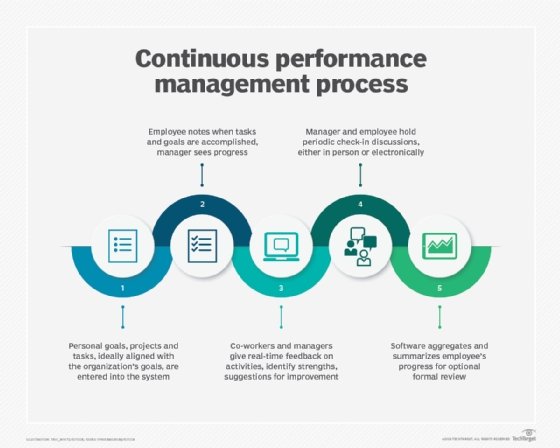
Getty Images/iStockphoto
6 tips to navigate an employee performance review
Worried about your next employee performance review? Follow these six tips to get the most out of it.
Organizations typically conduct performance reviews at least once a year, and rare is the individual who truly enjoys performance reviews. Most managers find it unpleasant to deliver negative feedback, and it's difficult for employees to receive it. If there is no criticism and only good things to say, performance reviews can seem like a waste of time.
This article outlines six tips to get through performance reviews as painlessly and professionally as possible:
- Accept that the performance review process is flawed.
- Prepare for the performance review throughout the year.
- Listen carefully when you receive negative feedback.
- Understand and navigate a performance improvement plan.
- Push for details during a positive performance review.
- Remember that you are in control of your career.
Accept that the performance review process is flawed
There are several issues with the performance review process, explained Carlos Garcia Jurado Suarez, a tech career coach based in Redmond, Wash. He's also a software engineer with an emphasis on machine learning-focused research, and he has held positions as an independent contributor and as a manager at several big tech companies, as well as one startup.
First and foremost, the performance review process is subjective, he said. For example, if a manager assesses two individuals who work on two different projects, it can be difficult to compare the quality of their contributions based on the level of difficulty each project demands.
It is also problematic to base developers' performance on a hard set of metrics, such as the following:
- How many lines of code they wrote.
- Their number of code contributions.
- The number of tickets they resolved.
Such metric-based evaluations can encourage or even drive the wrong behavior, Suarez said. For example, if the company measures performance by the volume of code produced, most people will write more code to obtain a good review even when it might be more appropriate to write lean code. "Software engineers are very good at optimizing to a metric," he said.
 Carlos Garcia Jurado Suarez
Carlos Garcia Jurado Suarez
There are also behind-the-scenes dynamics that can influence a performance review. Most companies tie performance reviews to rewards, in the form of bonuses, salary increases or promotions (which also result in a raise). This often involves a rating system, such as assigning scores in a 1-5 scoring range. All of this is contained within a typically limited budget that might be shared by and allocated among multiple managers and teams.
This puts managers in a tough position. Manager A might argue that everyone on their team earns the highest score of five and therefore they all deserve the associated financial reward. Managers B and C might feel the same way about the developers they oversee. However, none of these managers can give everybody the highest rating because the budget won't allow for it.
"That's why in most processes, you end up having to distribute those rewards," Suarez said. "You either have some really strong performers and some low performers and it balances out, or you evaluate most people as average."
Prepare for the performance review throughout the year
If you receive a poor performance review and it's a surprise, that's because managers haven't delivered regular feedback -- and you haven't sought it.
To avoid this situation, Suarez urges developers to be proactive and request feedback from their managers regularly, ideally every six to eight weeks. Not only will this help employees focus on areas that require improvement, but it also helps write the script for the eventual performance review.
"It starts to set expectations," Suarez said. "If throughout the year you've been getting feedback like, 'You're doing well,' it becomes much harder to then get a lower performance review.'"
Document these conversations, as well as the contributions that you have made throughout the year -- every time you do something that has a positive impact, he said. "In most [companies], you write your own [self-]assessment and you want to make sure that you have all of the material to call it out at that time," he said. It's easy to forget things that you did months ago that you could apply to your portion of a performance review.
Listen carefully when you receive negative feedback
Negative performance reviews can take several different forms, including the following:
- The employee expected a promotion but didn't get it.
- The individual is informed that their performance is sliding, or that they need to improve upon or acquire certain skills.
- They are informed that their performance is so poor that they're being put on a performance improvement plan (PIP).
- A combination of any or all of the above, which the employee did not expect.
If you do receive negative feedback, and it comes as a surprise, carefully listen to what your boss tells you. "It's very easy for us to shut off and not really listen to what's being said," Suarez said. "As hard as it is, try to first listen and understand what the feedback is."
 Tammy Gooler Loeb
Tammy Gooler Loeb
People who are surprised by negative feedback tend to feel powerless, explained Tammy Gooler Loeb, a Boston-based career and executive coach and author of Work from the Inside Out: Break Through Nine Common Obstacles and Design a Career That Fulfills You. She urges software developers in this scenario to step back and examine what elements are within their control.
"Really try to map out a few next steps," she said. This can be a grounding exercise that helps spark the conversations necessary to move forward. In fact, this might be an opportunity to request support in the form of additional training or help finding a mentor, she added.
Also, if your manager says you need to step up your performance, ask them what that should look like one, three, and six months from now -- and build a timeline to achieve that progress.
"[Create] something concrete so that you have some benchmarks, some behaviors, or something measurable that you're working toward," she said.
Understand and navigate a performance improvement plan (PIP)
The worst-case scenario is when the feedback is so negative that you're put on a performance improvement plan (PIP). At this point, it's usually a good idea to start looking for a different job, Suarez said. Organizations often take this step before they terminate an employee to protect against wrongful dismissal litigation.
That said, there are instances when an employee who receives a PIP can turn things around, but it depends in large part on that individual's relationship with their manager, Suarez said.
"Are they really trying to help you, or are they being pushed by some other process to dot the I's and cross the T's?" he said. "You've really got to get a read on that."
If you conclude that your manager is sincere in their offer to help, take advantage of that, request regular feedback and take action to improve.
Ultimately, however, workers in this position should ask themselves a hard question: can I really do better?
"If you don't have the right skills or abilities and you're super-stressed, it may be really hard for you to turn this around," he said. "If you already struggle with skills or to keep up with the level of contribution of your peers, you may be in the wrong role."
If that's the case, it's probably better to investigate what the right role might be for you going forward. If you have a good relationship with your manager, work with them to seek out different assignments that are more suited to your skills.

Push for details during a positive performance review
Managers don't always offer much feedback during positive performance reviews, Suarez said. If the employee asks how they might improve, the response is often not helpful: "You're doing great. Just keep doing what you're doing."
Those who wish to advance in their careers should push for more direct questions to evaluate their performance, Suarez said. Ask your manager for more detailed feedback -- for example, how would they rate you if you held the position just above the one you're currently in? "That's a way to elicit feedback for how to get promoted, how to get to that next level," he said.
Remember that you are in control of your career
While the performance review process might be flawed and managers often don't give enough regular feedback, software developers ultimately are in charge of their careers, Gooler Loeb said. If you don't receive the feedback and support you require, go out and get it.
"Often people make the assumption that they don't own their own role, their own work, and their own destiny," she said. "If you're not taking charge of your own professional growth and your own trajectory -- starting with asking your boss for a quarterly check-in on your goals -- that's on you, not on the organization."
If your manager glosses over that request, document what you perceive as your wins as well as areas you believe you need to improve and ask for your manager's thoughts. "It's a process that you can do yourself and take charge of," she said.
Carolyn Heinze is a Paris-based freelance writer. She covers several technology and business areas, including HR software and sustainability.











